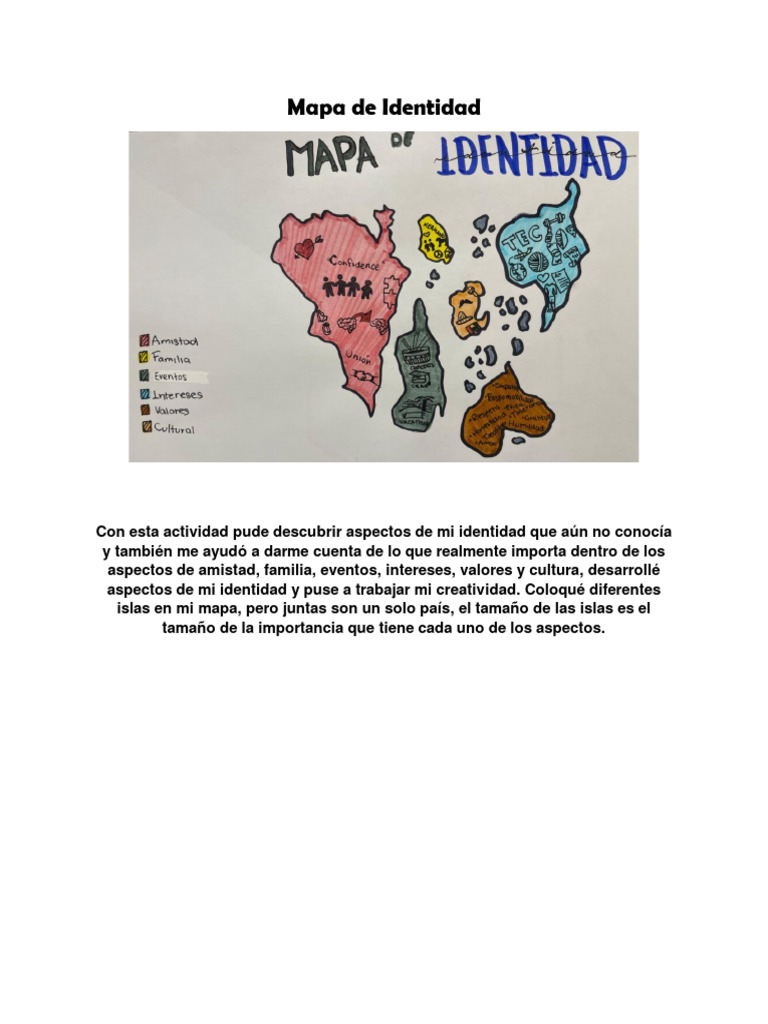The concept of “mapeo de identidad,” or identity mapping, emerges as an insightful framework for individuals and communities seeking to explore and articulate their collective and personal identities. This dynamic approach not only fosters a deeper understanding of self and surroundings but also catalyzes transformative shifts in perspective. By engaging in the process of identity mapping, one can uncover intricate layers of history, culture, and interpersonal relationships that shape our existence. This article will delve into the various facets of identity mapping, illuminating its significance in fostering curiosity and broadening our understanding of identity in an increasingly complex world.
Identity mapping serves as a powerful tool for introspection and community engagement. It begins with the fundamental question of “Who am I?” or “Who are we?” To navigate this inquiry, one often utilizes various elements, such as culture, geography, language, and individual experiences. By visually representing these components, identity mapping creates a tangible illustration of the multifaceted nature of identity. This can manifest through diagrams, charts, and even artistic works that encapsulate a group’s narrative or an individual’s journey.
A keen understanding of identity requires a multifarious lens. Environmental factors—such as one’s place of birth, the natural landscape, and historical context—intertwine seamlessly with social elements, such as family background and community dynamics. As one delves into identity mapping, it becomes apparent that these components are not isolated; they interact, weave together, and influence personal and collective identities over time.
Moreover, identity mapping emphasizes the importance of stories and narratives. Each individual carries a personal history that contributes to their identity, and by sharing these stories, we foster empathetic connections among people with diverse backgrounds. Through dialogue about ancestral roots, cultural practices, and present experiences, individuals can appreciate the vibrant tapestry of identities that populate their communities. This understanding encourages curiosity; indeed, the intricacies of someone else’s life can spark deeper inquiries into one’s identity and heritage.
In the context of modern educational spaces, identity mapping finds relevance as it encourages critical thinking and personal growth. Whether in academic settings or informal gatherings, the implementation of identity mapping exercises stimulates discussion. Groups may engage in creating visual representations of their identities, prompting profound reflections and the sharing of often overlooked experiences. This collective endeavor ignites curiosity, revealing the vast array of influences that shape our understandings of ourselves and each other.
Crucially, the act of identity mapping also sheds light on intersectionality. Many individuals inhabit overlapping identities, including ethnicity, gender, socioeconomic status, and more. Recognizing these interwoven identities enriches our appreciation for the human experience. The method serves to illuminate inequities that may exist within a community, prompting discussions that may lead to social change. Thus, identity mapping not only empowers individual exploration but can catalyze community action toward equity and representation.
Another vital aspect of identity mapping is its potential to heal. In a world rife with division and misunderstanding, the practice of exploring one’s lineage and cultural heritage can provide a sense of belonging and identity security. In some cases, marginalized groups have utilized identity mapping as a means of reclaiming narratives that have been historically suppressed or erased. By acknowledging these stories, we can forge connections based on mutual understanding, fostering a climate of inclusivity.
As we navigate an era characterized by rapid globalization and technological advancement, identity mapping offers a unique and urgent opportunity to contemplate our place within an interdependent world. The flourishing of digital spaces amplifies the complexity of identities as communities come together irrespective of physical boundaries. Online platforms serve as fertile ground for identity discourse, allowing individuals to experiment with the presentation of self—showcasing cultural backgrounds, aspirations, and challenges faced in the contemporary landscape.
In addition, identity mapping can shed light on our relationship with the environment. As climate change forces societies to reckon with their impacts, individuals are increasingly tracing the links between their identities and ecological stewardship. Recognizing that one’s cultural heritage is often tied to the land encourages a sense of responsibility toward nature. For many indigenous and local communities, identity mapping is integral to preserving traditional ecological knowledge that advocates for sustainable practices and respect for the natural world.
Moreover, the practice of identity mapping can serve as an introspective mirror reflecting the evolving nature of identity itself. Our identities are not static; they shift and adapt in response to new experiences, societal changes, and global phenomena. This fluidity can prompt individuals to consider how they wish to navigate their lives moving forward. The constant exploration inherent in identity mapping cultivates resilience and adaptability, essential qualities in an ever-changing world.
Ultimately, the practice of identity mapping is not merely an academic exercise; it is a living process that promotes self-discovery, dialogue, and connection. Engaging with this framework opens pathways to explore the interconnectedness of life experiences, histories, and culture. It challenges individuals to rethink their assumptions about identity and understand the myriad influences that contribute to who they are. Through curiosity and reflection, identity mapping can inspire a more profound commitment to shared values, social justice, and environmental stewardship—an invitation for all to partake in the remarkable journey of identity discovery.
